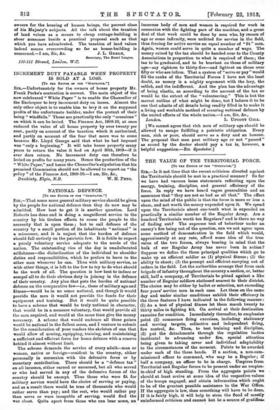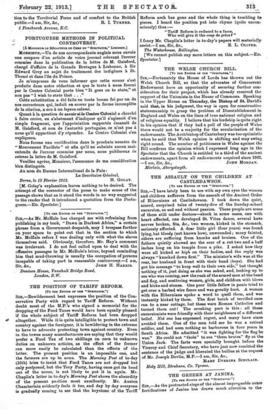THE VALUE OF THE TERRITORIAL FORCE.
[TO THE EDITOR OP THE "SPECTATOR."]
SIR,—IS it not time that the recent criticism directed against the Territorials should be met in a practical manner? So far we have had various loose statements reflecting upon the energy, training, discipline, and general efficiency of the force. In reply we have heard vague generalities and an assurance that " they are not so bad as all that." The effect upon the mind of the public is that the force is more or less a sham, and not worth the money expended upon it. We spend upon the Territorials about one-tenth what is expended on practically a similar number of the Regular Army. Are a hundred Territorials worth ten Regulars? and is there no way of finding out? The supreme test of behaviour under an enemy's fire being out of the question, can we not agree upon some method of demonstration in the field which would, approximately at any rate, afford some idea of the true value of the two forces, always bearing in mind that the- bulk of our Regular Army has never been in action ? Suppose we define the three principal qualities which go to make up an efficient soldier as (1) physical fitness ; (2) the ability to shoot; (3) the prompt and efficient carrying out of orders in the field. Let the authorities arrange that from each brigade of infantry throughout the country a section, or, better still, half a company, of Territorials be pitted against a like number of Regular soldiers stationed nearest to their district. The choice may be either by ballot or selection, not exceeding four years' service men in each case. Let them on the same day and under similar conditions exhibit their efficiency in the three features I have indicated in the following manner: (1) As a test of physical fitness let them march twenty to thirty miles in fighting kit. On arrival at their destination examine for condition. Immediately thereafter, to emphasize point (2) commence firing exercises, including stationary and moving targets, collective and independent firing, fire control, &c. Then, to test training and discipline, (3) put the detachments through the regulation tactics incidental to advancing under fire, special attention being given to taking cover and individual adaptability to the circumstances of the moment. Points to be awarded under each of the three heads. If a section, a non-com- missioned officer to command, who may be a Regular; if half a company, an officer to be in charge. Umpires from Territorial and Regular forces to be present under an umpire- in-chief of high standing. From the aggregate points we should at least arrive at some idea of the respective values of the troops engaged, and obtain information which ought to be of the greatest possible assistance to the War Office. If the aggregate is low, then something will have to be done. If it is fairly high, it will help to stem the flood of mostly uninformed criticism and cannot but be a source of gratificas
Lion to the Territorial Force and of comfort to the British















































 Previous page
Previous page